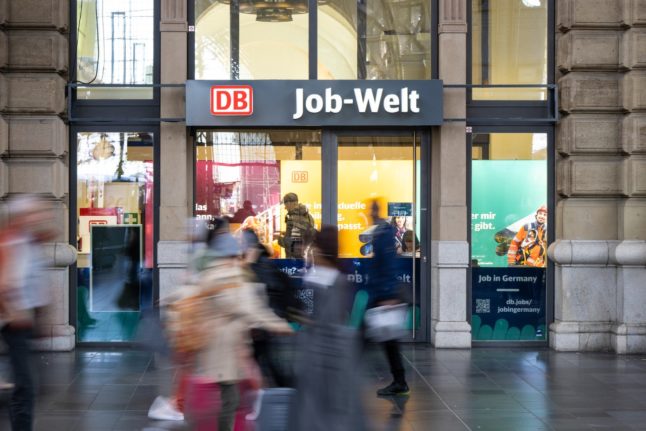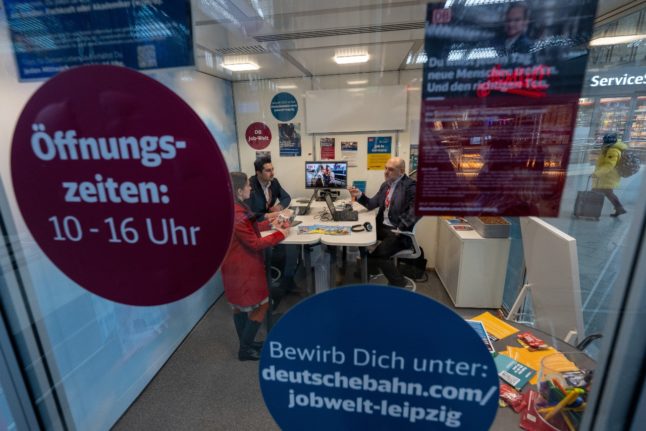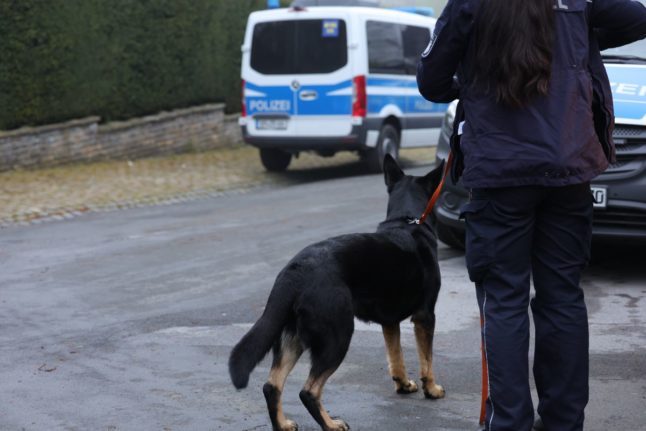As trains arrive and depart from Frankfurt’s main station, anyone curious about a change of career can find out all about the positions at Deutsche Bahn without even leaving the platform. Elsewhere in Germany, recruiters are turning to a new interview format where hopeful applicants get to know companies in the space of just five minutes.
To find new employees despite the tight labor market, more and more companies are using creative approaches to recruiting staff.
At DB, the company is eschewing the impersonal online world for an in-person drop-in centre conveniently located in stations in both Frankfurt and Leipzig.
“In the DB Job World, interested parties can simply drop by without an appointment and inform themselves about the more than 500 professions at DB in a relaxed atmosphere,” Annamaria Dahlmann, head of recruitment at the company for Hesse, Rhineland-Palatinate and Saarland told DPA.
Originally, the location in Frankfurt’s Hauptbahnhof (main train station) – which was formerly home to a travel agency – was opened as a careers counselling service for Ukrainian refugees, in cooperation with Germany’s Employment Agency.
Within six months of opening in April 2022, the site had become exclusively dedicated to jobs at Germany’s national rail operator – for all nationalities. However, one of the original visitors from Ukraine now works there as a counsellor, giving multilingual advice on weekdays about opportunities to join DB.
READ ALSO: REVEALED: The German industries most desperate for skilled workers

“We conduct 100 to 150 consultations here a month,” said Dahlmann. “About five to ten of them are hired every month.”
From managers to homeless people, apprenticeship seekers to career changers, the people who come to the centre have a range of backgrounds, explained Florian Brech, a project manager at Job World.
The spontaneous contact points in Frankfurt and Leipzig are among the many small building blocks the rail firm is using to recruit personnel. DB is hoping to hire around 5,000 new employees in Hesse each year, and more than 25,000 across Germany.
“As a company, we are also applying to people to some extent with the offer and approaching them with it,” Dahlmann said.
READ ALSO: INTERVIEW: How to get an English-speaking job in Germany
Skilled worker shortage
The state-owned rail operator is far from the only company trying to find new ways to source the workers it needs in Germany.
According to the Federal Ministry of Economics, there are around 630,000 vacancies in Germany that can’t be filled with skilled workers due to severe labour shortages in the country.
This is largely to do with changing demographics: while swathes of workers from the baby boomer generation are entering retirement, fewer and fewer young people are joining the workforce, and those that do may not have the skills they need for the jobs available.
The ministry estimates that by 2060, one in three positions will go unfilled – but only if Germany doesn’t attract enough workers from abroad.
This is the thinking behind the government’s new skilled worker immigration law, which is designed to encourage young people with skills or qualifications to move to Germany long-term. In the meantime, however, recruitment experts say that companies will need to be far more proactive in reaching out to potential job applicants.
READ ALSO:
- KEY POINTS: What’s in Germany’s new draft law on skilled immigration?
- ‘600,000 vacancies’: Why Germany’s skilled worker shortage is greater than ever
One example is the Stell Mich Ein (Hire Me) platform, which has been organising speed recruiting events in the communications industry throughout Germany since 2012. The events are based on the speed dating format and generally take place in major cities like Frankfurt, Hamburg and Berlin as well as online, giving recruiters from design, PR and marketing agencies a chance to meet numerous candidates face-to-face.

“Today, companies have to be active in their search for applicants,” project manager Steven Hille told DPA.
At the Stell Mich Ein events, 30 career starters and young professionals can get to know up to ten agencies in the space of one evening. They provide one application and take part in up to ten snappy interviews at different companies – generally lasting no more than five minutes. Once the rapid-fire interview is over, applicants change tables just like they would at a speed dating night.
While companies pay €1,500 to take part in the event, entrance is free for applicants – though the process is selective.
The organisers select from more than 100 applicants on the basis of their online applications, references and career goals.
“Companies hire an average of 1.25 people per event,” explained Hille. “Every third applicant finds a job after participating.”
READ ALSO: Which sectors are looking to hire in Germany?
Of course, it’s normally not as simple as signing a contract after just five minutes: the mini interviews are usually followed by more formal interviews and potentially a concrete job offer at a later date.
Nevertheless, the format has been so successful that other industries have started to adopt it as well. Most recently, Stell Mich Ein worked with the tourism and travel sector to launch a new platform called Easyboarding, which uses the same speed-dating interview process.
“Especially in tourism, the Covid pandemic has opened up large gaps in personnel,” said Hille. “Speed recruiting at events is intended to help overcome the shortage of skilled workers.”



 Please whitelist us to continue reading.
Please whitelist us to continue reading.
Member comments